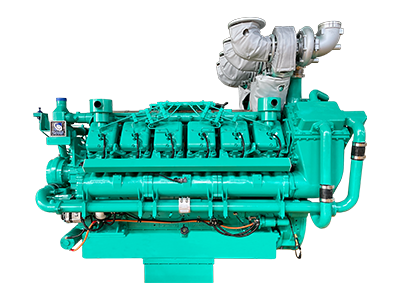Diesel Engine
Generator Set
The efficiency of a generator set is influenced by various factors, including key elements such as fuel combustion efficiency and electrical energy conversion efficiency.
1、 Factors related to fuel combustion efficiency
Fuel quality
For diesel generator sets, indicators such as the cetane number of diesel are crucial. Diesel with high cetane number has good self ignition performance, which can make the combustion process closer to the ideal state and burn more fully. For example, using diesel with poor quality and high impurities can lead to incomplete combustion, carbon deposition, and reduced combustion efficiency.
For gas-fired power generation units, the purity and composition of the gas are crucial. If there are too many impurities or non combustible components in the gas, it will dilute the combustible mixture, slow down the combustion speed, and reduce the combustion efficiency.

Combustion process control
The mixing ratio of air and fuel is an important factor affecting combustion efficiency. In diesel engines, appropriate fuel injection timing and quantity, as well as a good intake system, can ensure thorough mixing of fuel and air. For example, adopting turbocharging technology can increase the intake air volume, allowing fuel to burn in a more abundant oxygen environment and improve combustion efficiency.
The temperature and pressure inside the combustion chamber can also affect the combustion efficiency. Appropriate temperature and pressure conditions contribute to the rapid evaporation and complete combustion of fuel. If the temperature inside the combustion chamber is too low, the fuel may not be fully burned and may be discharged; If the temperature is too high, it may cause abnormal combustion phenomena such as detonation, damage the engine, and also reduce efficiency.
Design and operating conditions of the engine
The compression ratio design of the engine will affect combustion efficiency. A higher compression ratio can increase combustion temperature and pressure, making fuel combustion more complete. However, a high compression ratio can also cause problems such as detonation.
The load condition of the engine is also crucial. Under partial load conditions, the engine may not be able to achieve optimal combustion conditions. For example, when the load on the generator set is low, the fuel injection amount decreases, and the uniformity of air and fuel mixing may deteriorate, leading to a decrease in combustion efficiency.
2、 Factors related to energy conversion efficiency
Generator type and design
The energy conversion efficiency of different types of generators, such as synchronous generators and asynchronous generators, varies. The power factor of synchronous generators can be adjusted to achieve high energy conversion efficiency under suitable operating conditions.
The winding material and design of the generator can also affect efficiency. The use of high-purity copper windings can reduce resistance losses and improve energy conversion efficiency. Meanwhile, a reasonable magnetic field design can enhance electromagnetic induction, reduce hysteresis losses and eddy current losses.
Power load characteristics
The power factor of the load has a significant impact on the energy conversion efficiency of the generator. When the power factor of the load is low, the generator needs to provide more reactive power, resulting in increased current, increased line losses, and decreased energy conversion efficiency. For example, when a large number of inductive loads (such as electric motors) are running simultaneously, it will lower the power factor and affect the efficiency of the generator set.
The fluctuation of load is also important. Frequent load changes can cause instability in the output voltage and frequency of the generator, requiring constant adjustment of magnetic field and other parameters to adapt to load changes. This increases energy loss and reduces energy conversion efficiency.